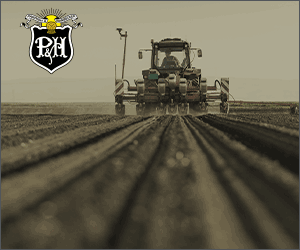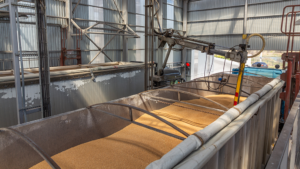What do Canadians think about food?
RESEARCH IDENTIFIES WHAT CONSUMERS CARE ABOUT

CANADIAN CONSUMERS ARE growing increasingly concerned about the cost of food and the affordability of healthy food, according to the 2023 Canadian Centre for Food Integrity’s (CCFI) 2023 Public Trust Research Report.
The CCFI’s annual research project is a national survey of Canadian consumers that aims to track public perceptions about the Canadian food, agriculture, and food system issues; measure public trust in Canada’s food, agriculture, and food system stakeholders; and explore attitudes and behaviours on important topics such as food safety, sustainability, and consumer habits. With a large sample size of more than 2,500 Canadians from coast to coast, the CCFI survey is a reliable source of information to help organizations like Grain Farmers of Ontario better understand consumer insights into food and health and help to inform staff who plan, organize, and implement consumer outreach programs like Good in Every Grain, the Grains on the Go Trailer, and Good in Every Classroom.
FOOD COSTS A BIG CONCERN
Food costs and affordability continue to be the most important issue for Canadian consumers in the face of inflation, rising interest rates, and high housing costs. More than half (54 per cent) of Canadians surveyed reported that they are extremely concerned about the affordability of food compared to a year ago, which was eight points higher than last year, and 28 per cent higher than in 2020. Inflation (48 per cent), health care (44 per cent), housing prices (42 per cent), and the affordability of healthy food (41 per cent) round out the top five issues that consumers are concerned about.
To mitigate the impact of the affordability of food, respondents reported that they are adapting their consumer habits in several ways, including reducing food waste (45 per cent of respondents), cooking more meals at home (42 per cent), and buying less food (37 per cent). Other strategies include buying more frozen food, changing grocery stores, buying more food in bulk, and changing the types of recipes they prepare. Fifteen per cent of respondents reported that they skipped meals in response to the rising cost of food.
When it comes to purchasing food, price was the most important factor for respondents, followed by quality, freshness, and nutritional value — all of which ranked higher than in 2022. Convenience and environmental impact ranked lowest; both were less important to consumers than in 2022.
PUBLIC TRUST IN FARMING
While Canadians are concerned about the cost of food, there is relative stability in their overall perception of Canada’s food system — two key indicators have remained unchanged year over year: public trust across most food and agriculture stakeholders and the proportion of Canadians who feel the food system is headed in the right direction — 34 per cent feel the food system is headed in the right direction — with 26 percent reporting that things are heading in the wrong direction.
Farmers continue to enjoy a high level of trust among Canadian consumers: 21 per cent of respondents rated farmers as “very trustworthy,” with scientists (18 per cent) and university researchers (14 per cent) rounding out the top three most trustworthy groups. Restaurants (six per cent), food processors and manufacturers (5 per cent), and politicians ranked at the bottom of the list.
When it comes to specific agricultural practices in crop production, 33 per cent of respondents said they were “very concerned” about the use of pesticides, up from 30 per cent in 2020. Eating food from genetically engineered crops was ranked as “very concerned” for 25 per cent of respondents; however, this response has held relatively steady since 2020.
CLIMATE CHANGE AND SUSTAINABILITY
While Canadian’s concerns are deeply connected to their pocketbooks, climate change continues to be a top-10 issue for Canadians, ranking seventh out of 22 issues (with 34 per cent providing a ranking of 9 – 10 out of 10). Environmental sustainability in farming falls even further down the list; 22 percent ranked the issues as very concerning.
When polled about specific agricultural practices, crop rotation and cover crops to improve soil health was viewed as the most effective farm sustainability practices (60 per cent), followed by automated irrigation systems to reduce water waste and improve crop yields (56 per cent), precision farming to optimize resources and reduce fertilizer and pesticide use (51 per cent), and minimum tillage practices to reduce greenhouse gas emissions and increase carbon sequestration (38 percent).
In the food processing and food retail sectors, reducing packaging and single-use plastics, reducing food waste, and donating surplus food to food banks were among the important issues identified by respondents.
USING THE DATA
“The CCFI public trust survey results are extremely important when it comes to designing public trust and consumer outreach activities,” says Brianne Curtis, public relations specialist at Grain Farmers of Ontario. “We want to know what consumers are thinking and what kinds of choices they are making so that we can develop tools, resources, and information to address their concerns and help them make the best choices when purchasing grain products.”
Curtis says that, for example, knowing that the cost of food is such a big concern for Canadians helps drive public outreach and social media activities, such as developing cost-conscious recipes and helping consumers understand that including grains in their diet can be an economical choice.
“We also want to know what concerns Canadians have about farming practices so we can prepare information and resources to help address those concerns,” says Curtis, who points to public-facing events that Grain Farmers of Ontario attends, like the Canadian National Exhibition and the Royal Agricultural Winter Fair as opportunities to disseminate factual information. “The CCFI data helps us be prepared with answers when visitors come to our booth with questions.”
The 2023 CCFI report can be read in its entirety at www.foodintegrity.ca. •

























